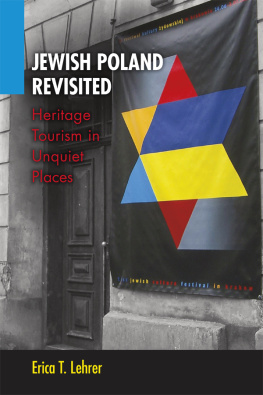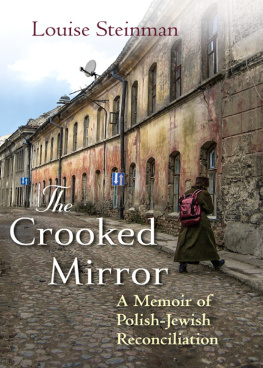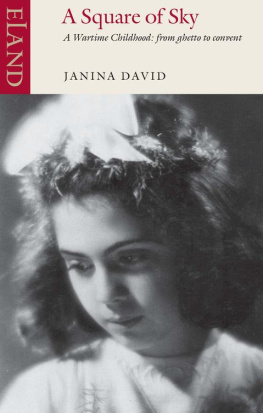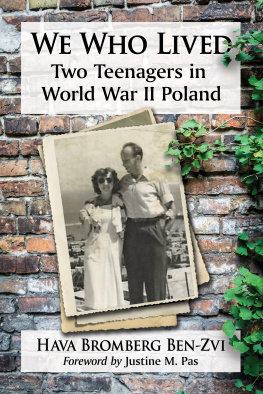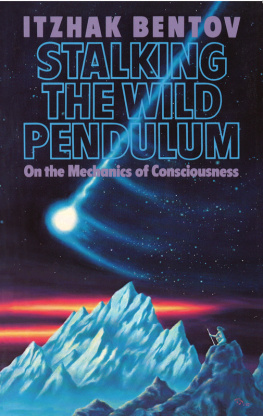Raphael Patai Series in Jewish Folklore and Anthropology
A complete listing of the books in this series can be found at the back of this volume .
General Editor
Dan Ben-Amos
University of Pennsylvania
Advisory Editors
Jane S. Gerber
City University of New York
Barbara Kirshenblatt-Gimblett
New York University
Aliza Shenhar
University of Haifa
Amnon Shiloah
Hebrew University
Harvey E. Goldberg
Hebrew University
Samuel G. Armistead
University of California, Davis
Guy H. Haskell
Emory University
Copyright 2001 by Wayne State University Press, Detroit, Michigan 48201. All material in this work, except as identified below, is licensed under a Creative Commons Attribution-NonCommercial 3.0 United States License. To view a copy of this license, visit https://creativecommons.org/licenses/by-nc/3.0/us/.
All material not licensed under a Creative Commons license is all rights reserved. Permission must be obtained from the copyright owner to use this material.
The publication of this volume in a freely accessible digital format has been made possible by a major grant from the National Endowment for the Humanities and the Mellon Foundation through their Humanities Open Book Program.
Library of Congress Cataloging-in-Publication Data
Bar-Yitshak, Hayah.
Jewish Polandlegends of origin : ethnopoetics and legendary chronicles / Haya Bar-Itzhak.
p. cm. (Raphael Patai series in Jewish folklore and anthropology)
Includes bibliographical references and indexes.
ISBN 978-0-8143-4391-3 (paperback); 978-0-8143-4392-0 (ebook)
1. Legends, JewishPolandHistory and criticism. 2. JewsPolandFolklore. 3. Legends, JewishPoland. 4. JewsPolandOriginFolklore. I. Title. II. Series.
BM530 .B3115 2001
398.20899240438dc21 00-011672
Translation by Lenn Schramm
Wayne State University Press thanks the following individuals and institutions for their generous permission to reprint material in this book: Arkady Publishing, Poland; The Israel Museum, Jerusalem; The Jewish Historical Institute, Warsaw; and Barbara Kirshenblatt-Gimblett.
Exhaustive efforts were made to obtain permission for use of material in this text. Any missed permissions resulted from a lack of information about the material, copyright holder, or both. If you are a copyright holder of such material, please contact WSUP at wsupressrights@wayne.edu .
http://wsupress.wayne.edu/
Preface
The first appearance of Jews in Poland and their adventures during their early years of settlement in the country are concealed in the undocumented shadows of history. The written record indicates that, beginning in the thirteenth century and particularly in the fourteenth century, Poland was a destination for Jewish refugees from Germany and from the areas along the southeastern borders of Kievan Rus (Cygielman 1991, 26). Going back further, late-twelfth-century documents refer to the existence of Jewish communities in Poland (Feldman 1934; Weinryb 1973, vii). Some historians, however, believe that Jews reached Poland as early as the tenth and eleventh centuriesand perhaps even the ninth century (Sternberg 1878, 615; Lelewel 185156, 18; Kraushar 1865, 40, 57, 65; Baaban 1948, 15; Schipper 1926, 15). According to Cygielman, the tendency to represent the Jews as Polish autochthons was prominent mainly in Jewish intellectual circles, in support of their sociopolitical thesis that the Jews, as original inhabitants of Poland, merited full civil rights (Cygielman 1991, 2728). This teaches us something about the nature of historiography; as Weinryb puts it, the historians of Eastern European Jewry created their own myths (1962, 1012).
Nineteenth-century historiography was influenced by the struggle for liberalism and progress; for minority groups like the Jews, this struggle was focused in their campaign for emancipation. The writing of history became part of the political contest. Historians who wanted to present the Jews as Polish autochthons but lacked written sources to ground their claim sometimes built on the legends of origin of Polish Jewry. These scholars transcribed the legends and contributed to their preservationas did their opponents, who cited the same legends while seeking to refute their historical reliability.
Even if we accept the hypothesis that Jews did not settle in Poland until the thirteenth and fourteenth centuries, historians agree that in Poland they enjoyed rights and privileges denied them elsewhere in Europe. In this context mention must be made to the privileges granted to the Jews by King Bolesaw of Kalisz in the thirteenth century and expanded in the next century by Casimir the Great of the House of Piast. These privileges brought prosperity for the Jews, accompanied by a spiritual flowering reflected in the theological production of the rabbis and sages who arose in Poland.
By Polish Jewry I mean the historical community that first coalesced in the kingdom of Poland, without reference to the vicissitudes of political geography. This kingdom, large and powerful until the mid-eighteenth century, ceased to exist as an independent political entity in 1795, when it was partitioned among Russia, Prussia, and Austria. The independent Polish republic was not reconstituted until after World War I. Communist Poland, after World War II, was assigned different boundaries. Hence, although it is difficult to speak of Polish Jewry in geopolitical terms, we may accept Rosmans contention about the Jews of post-partition Poland:
The Jews who lived in areas that were formerly Polish territory and had become parts of the kingdom of Prussia and the Austrian and Russian empires did not undergo any radical and immediate religious, economic, or social changes. Rather, they remained steadfast to the way of life that had characterized Polish Jewry.... Even when the changes caused by partition intensified, Jewish society and its religious, social, and economic institutions endured and displayed an impressive capacity for survival. The descendants of the Jews of Poland preserved the unique features that were immediately evident to them, to other Jews, and to the non-Jewish world. (Rosman 1991, 19)
Polish Jewry was annihilated during World War II. Although there were still Jews in post-Holocaust Poland, one can no longer speak of Jewish communities. Hence, according to the legendary chronicles, we are dealing with a millennium of Jewish life and creativity in Poland.
The history of Polish Jewry and the output of its rabbis have been studied extensively. By contrast, their folk art has received precious little attention. The present study deals with the literary manifestations of the folk art of Polish Jewry, with a particular focus on their legends of origin. What are legends of origin? Before answering this question I would like to offer a few words about folk literature in general and legend in particular. The development of folklore studies has altered the definitions of folklore and folk literature. Whereas the emphasis used to be on the circumstance of oral transmission and the element of traditionthat is, the fact that the work is passed from generation to generation (Noy 1982, 79), contemporary folklore studies emphasize the element of communication and defines the folk tale as one type of communication process (Brunvand 1968, 5; Georges 1983, 135). Ben-Amos, in his article Toward a Definition of Folklore in Context, sees the folklore in general and the folk tale in particular as a process of small-group communications by means of an artistic medium (Ben-Amos 1971).






